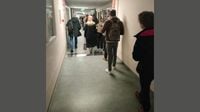On Thursday, March 27, 2025, a significant breakthrough was achieved in the Dutch healthcare sector as the FNV (a prominent trade union) and other healthcare unions announced a tentative agreement with the Nederlandse Vereniging Ziekenhuizen (NVZ) regarding a new collective labor agreement (cao) for hospital employees. This development has led to the suspension of planned strikes that had been looming over the sector.
The agreement is set to benefit over 225,000 hospital workers, providing them with a structured salary increase totaling 8% over the next eighteen months. The salary increments will be implemented in four stages: an initial 2% increase effective February 2025, followed by another 2% in August 2025, with subsequent increases of 2% in February 2026 and August 2026. This progressive salary adjustment is a marked improvement compared to earlier proposals from the hospitals, which suggested a total increase of only 6% over the same period.
Elise Merlijn, a board member of FNV Zorg & Welzijn, expressed satisfaction with the negotiations, stating, "We have put significant pressure on the employers. They initially sought to implement unfavorable changes to the labor agreement, but those proposals have now been set aside. The hospitals are willing to improve several key aspects, making working in a hospital considerably more appealing. We are pleased with this outcome, not only for the thousands of employees but also for their patients." This sentiment underscores the importance of the agreement for both healthcare workers and the quality of care they provide.
In addition to salary increases, the new agreement brings several other improvements. For instance, compensation for irregular working hours will see enhancements, including a 38% hourly bonus for employees working on Saturday mornings between 08:00 and 12:00. Furthermore, the travel allowance will increase incrementally, rising to €0.18 per kilometer in June 2025 and reaching €0.21 per kilometer by February 2026.
Measures aimed at alleviating work pressure have also been introduced. A time-saving arrangement will allow employees to save time, contributing to a better work-life balance. Additionally, those on night standby duty will be guaranteed at least eight hours of uninterrupted rest before resuming morning shifts. A clothing allowance of €50 will be provided to employees required to change into specific work attire due to hygiene protocols, addressing concerns about the time and effort involved in this process.
The collective labor agreement will also improve break regulations and advance the generational scheme, facilitating a smoother transition for employees nearing the end of their careers. The FNV plans to explore the possibility of implementing a 32-hour workweek in collaboration with the hospitals, assessing the implications of adjusting the standard workweek between 32 and 40 hours.
As part of the agreement, the CNV (another trade union) and other unions have also emphasized the significance of the actions taken by their members. Joost Veldt, a negotiator representing CNV, noted, "The willingness of hospital personnel to take action has undoubtedly contributed to this positive outcome. The employers recognized the strong resolve of the workforce, which compelled them to present a new offer that included several enhancements. We now have a result to present to our members, and I am already receiving signals of relief from those who are glad that they do not have to proceed with the planned actions, considering the well-being of patients."
In a related development, the introduction of a clothing allowance of €50 per month for non-academic hospital staff has been confirmed. This allowance is intended to compensate employees for the time spent collecting, returning, and changing into their work uniforms. As many healthcare workers are required to wear specific clothing during their shifts, the allowance acknowledges the logistical challenges they face.
Ingrid, a nurse working in a hospital in South Holland, shared her experience, stating, "I always arrive at work 25 minutes before my shift starts. The wait to collect my uniform can be quite lengthy, especially in the mornings when many staff members arrive simultaneously. The automated collection points can sometimes malfunction, adding to the delays. Given the time spent on these tasks, the €50 allowance seems justified."
Hubert Vankan, a representative of the NU'91 union, echoed this sentiment, highlighting that the time spent waiting for uniforms can significantly impact staff schedules. He noted, "In extreme cases, it can take an hour just to collect and return clothing. Furthermore, staff often have to walk considerable distances from the collection point to their respective departments, which can add to their daily workload."
While the unions are optimistic about the €50 clothing allowance, they acknowledge that it may not be sufficient for all employees. Vankan stated, "An investigation will be conducted to assess whether this allowance meets the needs of all staff members. The findings will provide clarity on whether the allowance is adequate in light of the time and effort involved in managing work attire."
Overall, the new collective labor agreement represents a significant step forward for hospital employees in the Netherlands. With a focus on improving working conditions, enhancing compensation, and addressing the unique challenges faced by healthcare workers, the agreement is expected to foster a more supportive and sustainable work environment. As discussions continue within the unions regarding the agreement, the outcome will ultimately shape the future of labor relations in the Dutch healthcare sector.






